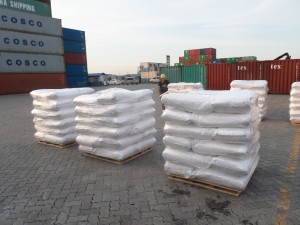Sodium carboxymethyl cellulose (CMC) is a water-soluble polymer derived from cellulose, a natural compound found in plant cell walls. It is commonly used as a thickener, stabilizer, and emulsifier in a wide range of industries, including food, pharmaceuticals, personal care, and textiles. In this article, we will discuss the properties, applications, and benefits of CMC.
Properties of CMC
CMC is a white or off-white, odorless, and tasteless powder that is highly soluble in water. It is derived from cellulose through a chemical modification process that involves the addition of carboxymethyl groups to the cellulose molecule. The degree of substitution (DS) determines the number of carboxymethyl groups per glucose unit in the cellulose molecule, which affects the properties of CMC.
CMC has several properties that make it useful in various applications. It is highly viscous and has a good water-holding capacity, which makes it an excellent thickener and stabilizer. It is also a good emulsifier and can form stable suspensions in aqueous solutions. Furthermore, CMC is pH-sensitive, with its viscosity decreasing as the pH increases. This property allows it to be used in a wide range of pH environments.
Applications of CMC
- Food Industry
CMC is a widely used ingredient in the food industry, where it is used as a thickener, stabilizer, and emulsifier in a variety of products. It is commonly used in baked goods, dairy products, sauces, dressings, and beverages. In baked goods, CMC helps to improve the texture, crumb structure, and shelf life of the final product. In dairy products, CMC prevents the formation of ice crystals and improves the texture and mouthfeel of ice cream and other frozen desserts. In sauces and dressings, CMC helps to prevent separation and maintain the desired consistency and appearance.
- Pharmaceutical Industry
CMC is also used in the pharmaceutical industry, where it is used as a binder, disintegrant, and thickener in tablet and capsule formulations. It is also used in topical formulations such as creams and gels as a thickener and emulsifier. CMC is a biocompatible and biodegradable material, making it a safe and effective option for pharmaceutical applications.
- Personal Care Industry
CMC is used in the personal care industry as a thickener, stabilizer, and emulsifier in a wide range of products, including shampoos, conditioners, lotions, and creams. In hair care products, CMC helps to improve the texture and appearance of hair, while in skin care products, it helps to improve the spreadability and absorption of active ingredients.
- Textile Industry
CMC is used in the textile industry as a sizing agent, which helps to improve the strength and stability of the yarn during weaving. It is also used as a thickener in printing pastes and as a binder in dyeing and finishing processes.
Benefits of CMC
- Improved Texture and Appearance
CMC is a versatile ingredient that can help to improve the texture, consistency, and appearance of a wide range of products. It can be used as a thickener, stabilizer, and emulsifier, which helps to improve the overall quality and appeal of the final product.
- Improved Shelf Life
CMC can help to improve the shelf life of food and pharmaceutical products by preventing the separation of ingredients and the formation of ice crystals. This property helps to maintain the quality and freshness of the product over an extended period.
- Cost-Effective
CMC is a cost-effective alternative to other thickeners and stabilizers used in various applications. It is widely available and has a lower cost compared to other synthetic thickeners and stabilizers, making it an attractive option for many industries.
- Biocompatible and Biodegradable
CMC is a biocompatible and biodegradable material, which makes it a safe and environmentally friendly option for use in various industries. It does not have any harmful effects on human health, and it can be easily degraded in the environment.
- Versatility
CMC is a versatile ingredient that can be used in a wide range of applications. It can be used as a thickener, stabilizer, and emulsifier in food, pharmaceuticals, personal care, and textile industries. This versatility makes it a popular ingredient in many industries.

Conclusion
Sodium carboxymethyl cellulose (CMC) is a versatile and widely used polymer that is commonly used as a thickener, stabilizer, and emulsifier in various industries, including food, pharmaceuticals, personal care, and textiles. CMC has several properties that make it useful in various applications, including its high viscosity, good water-holding capacity, and pH-sensitivity. It is a cost-effective, biocompatible, and biodegradable material that can help to improve the texture, appearance, and shelf life of a wide range of products. With its versatility and numerous benefits, CMC is likely to continue to be an essential ingredient in many industries for years to come.
Post time: Mar-10-2023
